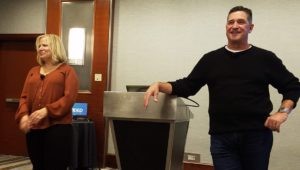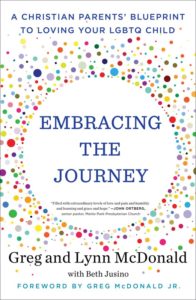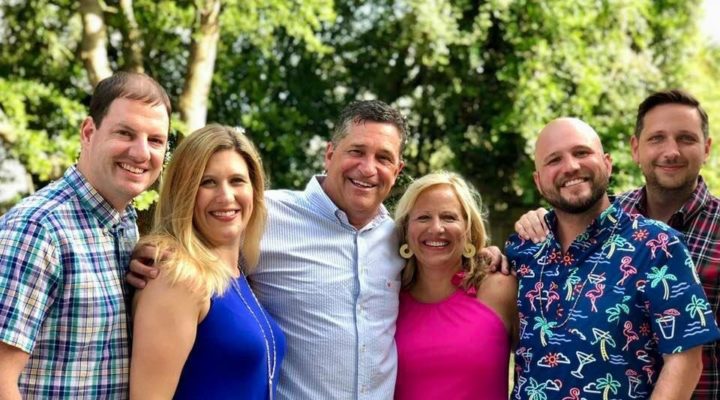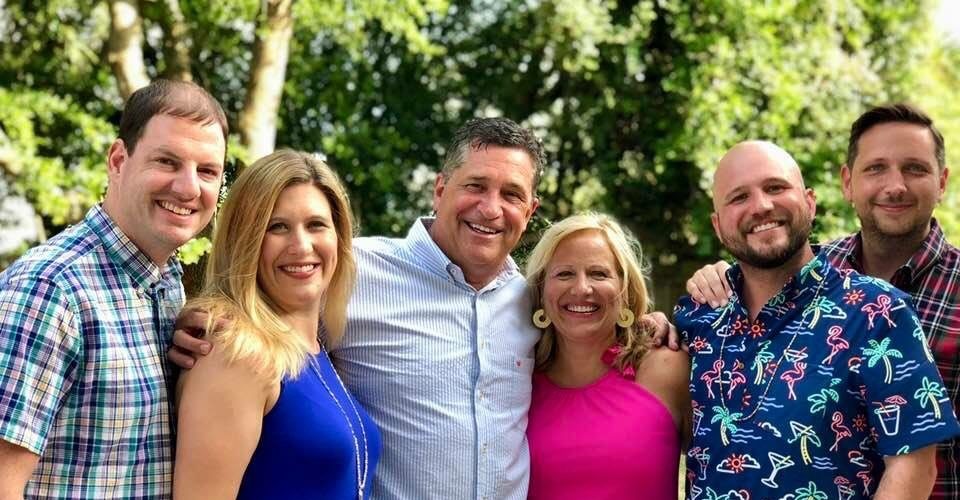Greg and Lynn McDonald are evangelical Christians who want parents to love their LGBTQ children — without exception and without condition. That’s all.
They’ll talk theology with you, but they’d rather sit down for a study of the Gospels. They have opinions about buzzwords like “affirming” or “non-affirming” but they’d rather talk about “inclusion.” They’re not concerned with labels like “liberal” or “conservative” because they’re more interested in talking about “relationship.”

Lynn and Greg McDonald speak at a session for Christian parents of LGBTQ kids.
And whatever fears parents have about saying the wrong things or making the wrong decisions, they’ll not be shocked at all. By their own account, they made every mistake possible when they learned their 17-year-old son, Greg Jr., is gay.
“When we finally learned he was gay, we said: ‘We love you. You could be a murderer and we’d still love you. But we need to get you fixed,’” Greg recalled. “Those words left my lips. And to make matters worse, I grounded him. Not because he was gay but because he lied to us about being gay. We had no idea the reason he didn’t tell us is he thought we weren’t safe.”
Without missing a beat, Greg then added this: “Tonight in Atlanta, 950 LGBTQ youths will sleep homeless on our streets. Most of them have been kicked out of their Christian homes.”
“Tonight in Atlanta, 950 LGBTQ youths will sleep homeless on our streets. Most of them have been kicked out of their Christian homes.”
Because of where they’ve been, what they’ve seen and what they’ve learned, they volunteer in Atlanta with Lost-n-Found Youth, a ministry to homeless LGBTQ youth. And they serve in multiple ways at their church, North Point Community Church, where Pastor Andy Stanley — seldom called “liberal” — blesses their work.
Labels don’t mean much to the McDonalds because they’ve learned the hard way the damage labels can do.
Coming to Christian faith
Both Greg and Lynn came to an evangelical Christian faith as adults. She had grown up Catholic and had more of a faith background then he did. Because of issues and attitudes he brought into the marriage, their own relationship hit the rocks quickly.
“Our marriage was faltering, and we were doing counseling,” Greg recalled. “We stumbled into a Christian Reformed Church in Western Michigan, where we were living at the time.” There, a pastor and his wife began to disciple them, and something happened that would bring them to renewed faith years later in Atlanta.
Greg explained: “We were sitting around the kitchen table reading the Bible and I said, ‘Why are these letters red?’ The pastor explained that the red letters are where Jesus is speaking and the black letters are where Matthew, Mark, Luke or John are speaking. I said, ‘I gave my life to Jesus; I just want to read red letters.’ And so we did that for months.”
A seed was planted, but it would be years before the fruit of those red letters bloomed.
Preventative measures
When Greg Jr. was a young child, his parents observed he was different than other boys in ways that made them wonder if he might be gay, which horrified them. So they doubled down on preventative measures.
She believed her faith was being tested to see if she loved God more than her child.
“We’re these conservative Christians and watching our son and his behavior growing up and it’s pretty gay-like,” Greg said. “We used every opportunity we could to make a point. If ‘Will and Grace’ came on the TV, I would jump up and say, ‘Turn that crap off, we’re not watching that.’ We were trying to say being gay is bad.”
Lynn added: “Because of the platform guys like James Dobson and others had, that’s what we thought.”
When their worst fears finally were confirmed, Lynn thought she had to choose between loving her son and loving God. “I felt like in some ways he was my Isaac and I needed to put him on the altar.” She believed her faith was being tested to see if she loved God more than her child.
‘Bible-teaching mama’
That led to the next phase of her response, what she calls the “Bible-teaching mama.” The problem was Greg Jr. had been educated in a church school, had attended Wednesday night and Sunday Bible studies for years, had been in YoungLife and everything evangelical children were supposed to do. As a result, he also knew the Bible.
“We would debate the Bible, and that was causing more and more pain,” she said.
That’s when Bible-preaching mama gave way to “evangelical mama,” she continued. “I thought if I can’t fix my son maybe I can fix his friends. They all need Jesus. So maybe that’s why God gave me a gay son.”
That also led only to distress. “Our relationship went from what I thought was good to him not even wanting to talk to me.”
“Greg Jr. would invite his friends over, and I would try to convert them,” she said. “This went on for quite a while. Finally Greg Jr. went to his dad and said, ‘You’ve got to get control over mom. If you and mom want me and my friends to come over and visit, then mom’s got to stop.’”
Later, they learned a term for these parental responses when they watched a brief video by ethicist David Gushee titled “You’re Hurting Me with Your Bible.”
“Lynn had weaponized the Bible,” Greg said. “It was clear we had lost influence.”
Back to the red letters
The disconnect between the faith they thought they knew and the reality of their family’s situation drove them back to the lesson they first learned around the kitchen table back in Michigan. “We got serious about spending time in the Gospels,” Greg explained. “We looked at a lot of red letters. This was a turning point.
“We asked: Who did Jesus say he was? Who did he hang out with? How did he treat people? What did he have to say? And we discovered if Jesus was true north, we were due south. We are supposed to be imitators of Christ, and we were way off course.”
With remorse, they went back to their then-young adult son and tried to make amends for the things they had said and done. “We said, we want to love you unconditionally,” Greg explained. “But Greg Jr. was like, I hear you, but you still look like mom and dad.”
Healing took time.
Stepping through pain
Somewhere along the way the McDonalds learned this truth, Lynn said: “Pain is actually the first step to healing. You need to embrace the pain so you can heal. When something happens that’s painful, God is saying, ‘I’m trying to tell you something here.’
“It’s interesting how the Lord allowed us to really understand him early on and then brought us back to him reading the red letters. We started with red letters, and when we were in pain we went back to the red letters.”
“So many of us listen to soundbites that don’t reflect Jesus,” Greg added. “When we started doing a lot of study about Jesus, it’s amazing the things Jesus does talk about and the things Jesus doesn’t talk about.”
Studying the red letters of the Gospels and taking one step at a time toward healing the relationship with their son prepared them for their current work walking alongside other parents in pain.
“The thing you can be assured of is that Jesus says to love our neighbors as ourselves — and that includes our children, straight or gay.”
“Our big message to parents is there are things in the Bible that may or may not make sense,” Greg said. “The thing you can be assured of is that Jesus says to love our neighbors as ourselves — and that includes our children, straight or gay. We are encouraged to love the way Jesus loves.
“When the light goes on for a parent and all the sudden they get it, that their job is not to convict but to love, we routinely get to see the parent and the child grow in a deeper relationship with God and with each other.”
There’s no shortcut to this healing, though, the McDonalds have found. Lynn quotes from Romans chapter 5, where the Apostle Paul says: “suffering produces endurance, and endurance produces character, and character produces hope, and hope does not disappoint us, because God’s love has been poured into our hearts through the Holy Spirit that has been given to us.”
“We all want to jump to hope,” Lynn said. “There are things God is going to show (parents) through their suffering that will lead to hope. One of the tools God uses in that suffering is us. We bring hope.”
Out of the closet
Long after their son was out of the closet, Greg and Lynn came out too as the parents of a gay son. “Once we were out of the closet, our phone started ringing,” Greg said. “We talked to dozens and dozens of families.”
But they still didn’t understand that God was calling them to a ministry of reconciliation. Then six years ago, their pastor, Andy Stanley, asked a question in a sermon: “What breaks your heart?”
 “We looked at each other and said, ‘The LGBTQ community and their families,’” Greg recalled. And that birthed a ministry — and ultimately a book — both called Embracing the Journey. The book then led to a detailed study guide, and the study guide led to hosting support groups.
“We looked at each other and said, ‘The LGBTQ community and their families,’” Greg recalled. And that birthed a ministry — and ultimately a book — both called Embracing the Journey. The book then led to a detailed study guide, and the study guide led to hosting support groups.
Currently, about 140 parents participate in six groups, including 40 parents of transgender children. More groups are needed, but Greg and Lynn can only stretch themselves so far. They are now working to multiply the ministry by equipping others to lead.
“When the child comes out of the closet, the vast majority of parents go in the closet, probably 90%,” Greg reported. “It’s a time of damage control, asking ‘What are we going to do? What are our friends going to think? What’s the church going to think? Will I still be able to lead a small group?’ Then there’s the loss of hopes and dreams and aspirations for grandchildren or family reputation. Isolation happens quickly.”
“That’s one of Satan’s greatest ploys, that if God doesn’t care, no one else will care,” Lynn added. “Parents will stay in the closet for a month or two or sometimes years.”
Reacting to the shock
Lynn, a breast cancer survivor, likens the shock of learning your child is gay or bisexual or transgender to the shock of getting a hard-to-hear medical diagnosis. “You start soaking up every bit of information you can find. It’s just like that with parents.”
“We wrote the study guide because we were constantly interacting with parents who didn’t have a place to go for help,” Greg said. To date, they and their coaching and counseling team have counseled one-on-one with more than 1,000 parents.
“We routinely hear from parents, two to five parents a day, who have just learned about their child,” he continued. “We end up doing coaching and counseling with them, on average an hour and a half in a telephone conversation. When parents come to us, typically they are hemorrhaging. We do a lot of triage, talking them safely off the roof.”
They wish they didn’t have to do this so much, Lynn added. “The reason we do this in the first place is it breaks our hearts that the local churches don’t have support groups to help parents work through what they are dealing with. What they are dealing with is loneliness, isolation, fear to go to their church for fear of judgment. They feel the need can’t be met at the local church.”
After an initial counseling session, the McDonalds — and now their coaching and counseling team members — hope to have stabilized the parents and get them engaged in an Embracing the Journey parent support group. “It’s about getting them connected with other parents so they don’t feel so isolated,” Lynn said. “They learn from one another as well as us.”
What do you believe?
Despite this spiritual first aid offered by Greg and Lynn, they still are asked frequently to give more specific answers about their beliefs
“One of our tag lines is, ‘Not in spite of the Bible but because of the Bible.’ Most parents fear the Bible is going to condemn their child.”
“We have people all the time who want to know, ‘Are you affirming or not affirming?’” Greg said. “First of all, it’s not about what Greg and Lynn believe. We view ‘affirming’ and ‘non-affirming’ as fighting words. If we say we’re affirming or non-affirming, we wipe out an entire audience we want to reach.
“It’s not that we’re short of an opinion,” Lynn said. “But our opinion is not what matters most. It’s a personal journey every individual has to take and has to go to God with. We try to educate parents in understanding that we don’t want you to believe something because we believe it. We want you to dive deep into prayer and ask God what God wants of you.”
Greg returned to the main idea of their calling, which is to build bridges between LGBTQ individuals and their families and the church. “It is easy to make a point; we’re not interested in making a point; we want to make a difference. Ultimately, we want to help LGBTQ individuals and their families move one step closer to Jesus. One of our tag lines is, ‘Not in spite of the Bible but because of the Bible.’ Most parents fear the Bible is going to condemn their child.”
Lynn added: “They are really surprised when we say, ‘Go back to the Bible and spend time in the Gospels.’”
Pastors need help too
The parents the McDonalds’ hear from aren’t just those sitting the pews at church; they’re also the parents who stand behind the pulpit. They now know far too many stories of pastors and pastors’ families living in pain because congregations force them to choose between their LGBTQ children and their jobs.
But they also have a message for pastors who think this issue doesn’t touch them directly.
Greg, a successful businessman, has done the math. “The statistics say between 3% and 11% of the population could identify as LGBTQ. Let’s take a really conservative number, say 5%, then what we know is 87% of people who identify as LGBTQ were raised in households of faith. And huge numbers of them want to come back to faith. Each one of those ‘kids’ has at least two parents. So that’s another 10%, not including siblings, grandparents, aunts, uncles and other loved ones. For the average pastor who stands and looks at his congregation on Sunday morning, conservatively as much as 20% to 40% percent of his congregation is impacted by someone they love who is LGBTQ.”
Research has shown that LGBTQ youths seriously contemplate suicide at almost three times the rate of their heterosexual peers. And LGBTQ youth who come from highly rejecting families are 8.4 times as likely to have attempted suicide as LGBTQ peers who reported no or low levels of family rejection. “At Embracing the Journey, we’re very intentional that we want to work with the most conservative parents because their kids are most at risk,” Greg said.
At the end of the day, the McDonalds want to help local churches be the safest place in their communities for youth to wrestle with spirituality, sexuality, drug addiction or anything else. “Our desire is that parents would find a soft, safe landing area in their local church to process the myriad of emotions that parents struggle with,” they agreed.


